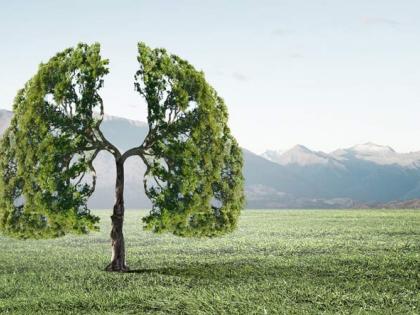Recalibrating to build a sustainable world
By Lokmat English Desk | Updated: November 5, 2020 17:36 IST2020-11-05T17:36:45+5:302020-11-05T17:36:52+5:30
Building sustainable economies with nature, not against it, can save the earth.

Recalibrating to build a sustainable world
The global pandemic remains uncertain and continues to impact the economy and society. However, amidst this chaos, we have started witnessing signs of hope as the quest to develop the vaccine, gathers momentum. The coronavirus shock is far more severe compared to the Great Financial Crisis in 2007–08, as it is impacting households, businesses, financial institutions and markets all at the same time—first in China and now globally. According to the United Nations Conference on Trade and Development (UNCTAD), it will likely cost the global economy between $1 trillion and $2 trillion in 2020[1]. Covid-19 has infected over 33 million people worldwide. India too has witnessed a major slump in the recently announced GDP which indicates a decline by 23.9% in Q1 of 2020 owing to the strict lockdown making it one of the worst hit nations in the world.
COVID 19 Impact on industries and environment
While the lockdown has had a negative impact on most sectors, it affected the manufacturing industry the most. The industrial landscape was hit hard due to lower production and lower offtake, longer credit periods, absence of employees due to the shutdown etc, with consequent effect on quality, cost and production volumes, hence creating both supply and demand shocks. However, this lockdown also has some positive effect on natural environment.
The study published in the British journal Nature Climate Change states that the world decreased its carbon emissions by 17% or 17 million tonnes in April at the peak of global shutdowns. The dramatic decrease in industrial activities, road traffic, tourism, air travel and restricted human intervention which turned out to be a boon for environment. Wildlife is restored, water quality in rivers is improving. According to the State of India’s Environment (SoE) report of 2019 around 12.5% of all deaths in India are due to air pollution, but the pandemic has turned the scheme of things in favour of the environment giving it the much-needed interruption. However, in terms of water provision as an essential service, public health demands a more resilient water supply for cleaning processes, as frequent hand washing became a norm especially in high density areas in India.
While the cost of the pandemic in terms of loss of human lives is painful, it is imperative to also consider the effects on the global economy and on sustainable development prospects. Unfortunately, this pandemic hit at a time when the United Nation’s Sustainable Development Goals (SDGs) were gaining traction and a significant number of countries were making good progress. The 2030 Agenda, the SDGs and the Paris Agreement on Climate Change are still our best chance for a sustainable world and brighter future.
Towards solutions
With the growth of India’s population and urbanization, its water bodies are getting more toxic day by day. Food security, human health, urban and rural settlements, energy production, industrial development & output, economic growth and ecosystems are all water-dependent and thus vulnerable to the impacts of climate change. Tackling the climate crisis—and socio-economic impacts of COVID-19—will require a holistic approach to recovery planning and policymaking. By adopting technologically advanced solutions and green economy policies, countries can pave the way for economic recovery and sustainable jobs based on new and environmentally sensitive business models.
Industries have started adopting artificial intelligence (AI) and machine learning, and now are advancing towards providing the best in class products and solutions when it comes to their water solutions. For example, an intelligent pump can sound an alarm in advance about its own maintenance or give an intimation on the forthcoming scheduled maintenances. By increasing reliability, simplicity and predictability, technology is now transforming data into insights. The cloud connectivity and digital services have helped the industry advance to another level to achieve the best.
The challenges, in terms of technological innovation, knowledge management, research and capacity development are to promote the generation of new tools and approaches through advanced research and development. It is equally important to accelerate the implementation of existing knowledge and technologies across all countries and regions. However, these actions will only lead to the intended outcomes if they are accompanied by increasing the awareness and educational & capacity development programmes, in order to widely disseminate the available knowledge and to stimulate the uptake of new and existing technologies.
As per Accenture’s 2020 Technology Vision report, robots are disinfecting cities, cooking food for the patients in hospitals and delivering packages. Smart devices are monitoring patients’ health and collecting valuable health data. Human-AI collaboration is leaving the proof-of-concept stage and becoming a critical tool for scientists studying the virus. While much of the world is shut down or on hold, innovation strives and keeps accelerating.
Conclusion
COVID-19 has reinforced the importance of access to safe and reliable water. All the stakeholders including government, companies and customers should seek to re-prioritize the water sector and understand that water is the most essential natural resource and is finite.
The global challenge of COVID-19 has spurred a massive innovation effort from companies, governments and individuals. Opportunities for new scope of technological businesses, that had years to prepare for, are quickly approaching. To meet these challenges, organizations will need to revolutionize and redefine themselves. People are now completely dependent on technology. We are living in an unprecedented time, heading into a fast-changing future.
COVID-19 is a stark reminder of how we should treat our planet and use it as learning chapter and start working on solutions to make then world healthy. Climate change cannot be defeated with just two-year or five-year plan. We all have to all come together and start contributing towards it. Only by building sustainable economies that work with nature, not against it, can save the earth.
Spokesperson: Saravanan Panneer Selvam, General Manager, INDO Region, Grundfos
Open in app